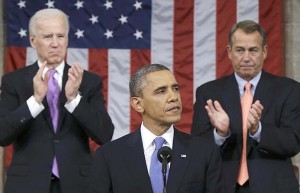
President Barack Obama's support of the pending Trans-Pacific Partnership isn't swaying Ford Motor Co. leaders to support it.
The bickering between anti-agreement automakers and pro-pact politicians over the details of the long-discussed Trans-Pacific Partnership continues to get louder and more strident.
President Barack Obama and U.S. Trade Representative Michael Froman today defended the parts of the deal related to currency manipulation, suggesting that the safeguards in deal should make automakers happy.
Conversely, the companies, in particular Ford Motor Co., claim the potential free trade deal doesn’t go far enough to prevent that from happening.
Obama praised the plan in an online essay on Medium, saying it will specifically help Detroit automakers and by opening up Japan’s auto market to more U.S. competition and reducing international tariffs.
“If you’re an autoworker in Michigan, the cars you build face taxes as high as 70% in Vietnam,” the president wrote, adding, “The Trans-Pacific Partnership will change that.”
Froman noted separately that deal not only cuts tariffs in Japan, but also in many other “closed countries” all of which represent potential new markets for U.S. makers.
“When you combine that with the potential opening of the Japanese market, the elimination of the 70% tariffs on autos into Vietnam, the elimination of the 30% tariffs into Malaysia, plus the elimination of non-tariff measures that are quite extensive in Malaysia, the increased opportunity to actually export autos … we think this is a strong outcome,” he said in a statement.
Approval of the deal means only 45% of a vehicle must be sourced from within the TPP, down from a comparable 50%-plus level under the two-decade old North American Free Trade Agreement rules.
The deal also sets a local sourcing threshold of 35 to 45% for individually traded auto parts. In essence, more than half of a vehicle could be sourced from outside the 12 countries participating in the trade pact and still be sold in the United States without tariffs.
(New Trans-Pacific trade deal faces challenge from U.S. auto industry. For more, Click Here.)
However, potential access to new markets, the pledge by the 12 TPP member countries confirming they are bound by the International Monetary Fund not to manipulate their currency for competitive advantage, and a side agreement forcing member countries to report their financial data isn’t appealing enough for Ford to sign off on the deal.
The Dearborn-based automaker said the proposal “falls outside the TPP and … fails to include dispute settlement mechanisms to ensure global rules prohibiting currency manipulation are enforced.”
(Click Here for details about FCA’s sharp slide in Q3 net income.)
“We appreciate that Congress escalated this priority for the administration,” Ford said in its statement, “but the currency forum (as the process has been referred to) does nothing to change the status quo.”
One Michigan politician, U.S. Rep. Sander Levin (D-Michigan), suggested trying renegotiate part of the deal and another, Rep. Debbie Dingell (D-Michigan) supported Ford and other groups, such as the Alliance for American Manufacturing and the United Steelworkers union, claiming the deal was bad.
(To see more about investors fleeing VW and Takata, Click Here.)
“The agreement’s lack of any meaningful protections against currency manipulation means millions of American jobs – in the auto industry and many other sectors – will continue to be threatened by foreign governments who attempt to tilt the global playing field in favor of their industries,” she said.

The link at the end of your story is incorrect. Investors aren’t “fleeing” VW and Toyota…its VW and TAKATA
Thanks for the catch, RJ. We’ll correct.
Paul E.
From the little that is known about the trade pact and the secrecy surrounding it’s creation, it makes me very suspect that this pact is not in the best interest of U.S. consumers nor most businesses. I don’t see any means to balance currency differences and production cost without a comprehensive import tariff system.
What this appears to be IMO is a ruse to import more inferior products from third world countries with massive essentially slave based production. The mentality is that supporting Vietnam will divert economic power away from China when the termination of importation of Chinese products is a far better economic policy for the U.S.